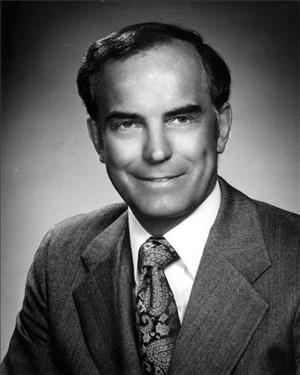On November 7, 1972, Republican Governor Daniel J. Evans (1925-2024) defeats former governor Albert D. Rosellini (1910-2011) to win an unprecedented third consecutive term. President Richard M. Nixon (1913-1994) wins the electoral votes of Washington and every other state except Massachusetts and the District of Columbia in a landslide victory over Democratic Senator George McGovern (1922-2012), but will resign within two years as a result of the Watergate scandal. Washington's six Democratic members of the U.S. House of Representatives are re-elected, and Republican Joel M. Pritchard (1925-1997) succeeds fellow Republican Thomas M. Pelly (1902-1973) in the First District. Voters also overwhelmingly approve a Public Disclosure Act and narrowly adopt a state Equal Rights Amendment.
An Historic Third Term
Dan Evans, a moderate Republican who championed education, environmental protection, and tax reform while leading the state through the turbulent years of the late 1960s, was first elected governor in 1964 by defeating two-term incumbent Albert Rosellini. Eight years later Rosellini, making his final attempt at a political comeback, set out to return the favor by denying Evans a third term. Rosellini won the Democratic nomination and for a time led Evans in the polls, but last-minute newspaper allegations of links to organized crime, although not proven, hurt his campaign.
Evans won with 50.78 percent (747,825 votes), while Rosellini took 42.82 percent (630,613 votes), and anti-tax candidate Vick Gould got most of the remainder. The result made Evans the first and so far the only Washington governor to win three consecutive terms. Fellow Republican Arthur B. Langlie (1900-1966) is to date the only other Washington governor who won three terms, but they were not consecutive, as he lost his first re-election bid to Mon Wallgren (1891-1961) in 1944, before winning the office back four years later and going on to a third victory in 1952.
Landslide and Scandal
President Nixon and Vice President Spiro T. Agnew (1918–1996) won 56.92 percent (837,135 votes) in Washington against 38.64 percent (568,334 votes) for South Dakota Senator McGovern and R. Sargent Shriver (b. 1915). Shriver was the replacement for McGovern's original running mate, Missouri Senator Thomas F. Eagleton (b. 1929), who withdrew from the ticket following revelations of his psychiatric treatment. Despite each of their nationwide landslide victories, neither man completed his term.
Agnew resigned in 1973 and pled no contest to tax evasion charges. Facing impeachment for obstruction of justice following the cover-up of the burglary committed by his campaign workers at the Washington D.C. headquarters of the national Democratic party, located in the Watergate apartment complex, Nixon resigned the presidency in August 1974. Gerald R. Ford (1913-2006) who had been appointed to succeed Agnew as Vice President, became the first U.S. President to hold office without being elected.
Incumbents Prevail
Six of Washington's seven U.S. House of Representatives seats were held by Democrats in 1972, and all six were easily re-elected -- Lloyd Meeds (1927-2005) in the Second District, highway advocate Julia Butler Hansen (1907-1988) in the Third, Mike McCormack (b. 1921) in the Fourth, future House Speaker Thomas S. Foley (1929-2013) in the Fifth, Floyd V. Hicks (1915-1992) in the Sixth, and future Secretary of Transportation and Senator Brock Adams (1927-2004) in the Seventh.
Republicans retained the First District seat as former state senator Joel Pritchard narrowly defeated Democrat John Hempelmann by 50.29 percent (107,581 votes) to 49.06 percent (104,959 votes) for the seat previously held by Thomas Pelly. After being re-elected to five additional House terms, Pritchard served two terms as a popular and low-key lieutenant governor from 1989 to 1997.
Landmark Ballot Measures
The 1972 election also featured a long list of ballot measures. Voters approved several, including two landmark provisions. An Equal Rights amendment to the state constitution passed by a slender margin. It took more than three weeks for the count to be concluded. Every few days, a three-inch blurb in newspapers would declare: "Equal Rights Amendment now ahead," or "Equal Rights Amendment trails again." When the final numbers were certified on November 29, 1972, the amendment prevailed by 50.52 to 49.48 percent (645,115 votes to 631,746). The constitutional amendment prohibits discrimination on the basis of sex in all areas of public life. Washington is one of only nine states to pass such an amendment. In 1972, Congress passed an Equal Rights amendment to the United States Constitution, but the states failed to ratify it.
Initiative 276, the landmark Public Disclosure Act, passed by a much wider margin -- 72 to 28 percent (959,143 votes to 372,693). The Act mandates disclosure of campaign financing, lobbying, and public officials' finances. It also makes almost all government records available to the public on request, with stiff financial penalties for agencies that do not respond fully to requests -- a powerful tool that citizen activists have used frequently over the years since I-276 was approved.

